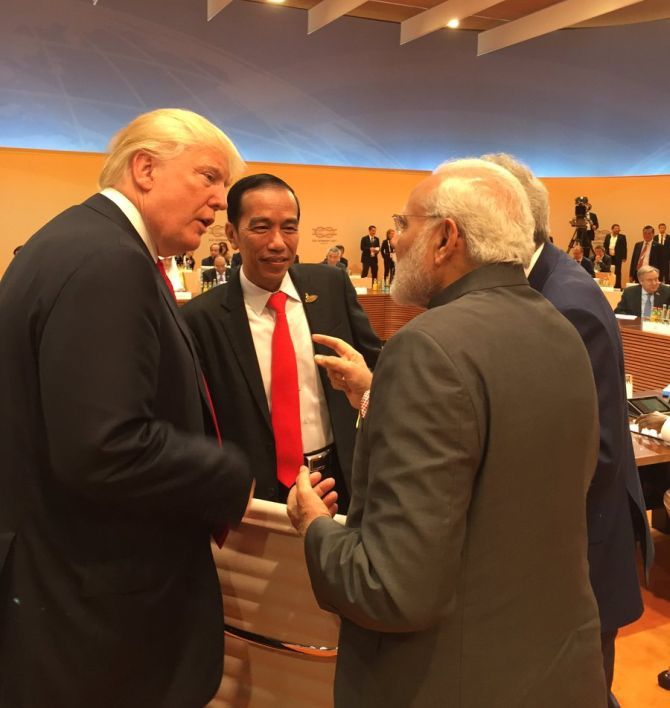'It is for the first time in 70 years that the US has come out totally in India's favour on the Kashmir issue,' says Colonel Anil A Athale (retd).

On August 21, 2017, American President Donald J Trump announced his Afghanistan policy.
While there was much that was 'old' (the use of military force to bring the Taliban to the negotiating table), there were also some new elements.
For the first time, the US openly named Pakistan as the main culprit behind the Afghan violence.
The statement also for the first time urged India to play a constructive role in Afghanistan.
It is easy to dismiss the whole exercise as 'old wine in an old bottle', but that would be ignorant.
For starters, Trump has avoided his predecessor's mistake in announcing an expiry date on American intervention or the US troop presence in Afghanistan.
By announcing a withdrawal date, Barack Obama actually encouraged the Taliban to wait the Americans out and in-built the failure of his 'surge' strategy!
Trump has bluntly stated that he will bomb the Taliban to the negotiating table.
A few months ago, the US dropped a giant conventional bomb (MOAB or mother of all bombs), a signal in that direction. The Afghan Taliban should expect a heavier US air offensive.
Trump has also put Pakistan on notice for its backing and sanctuaries for the Taliban. One should expect drone strikes in Pakistani territory.
One should not make the mistake of dismissing the new policy as 'temporary' due to the weakness of the Trump administration.
The policy review has a clear Pentagon stamp on it. Trump relies heavily on military advice and this is no exception.
So irrespective of whatever may be the fate of the Trump presidency, this policy prescription is likely to last a while.
Looking at the recent moves by the US on Kashmir, together with its new Afghan formulations, it marks a 'revolutionary' change from the past.
On June 26, 2017 when Prime Minister Narendra D Modi visited the US, the Americans declared the Hizbul Mujhideen international terrorists. It was a major diplomatic coup for India.
Last week, as a follow up measure, the US declared the HM an international terrorist organisation.
It is for the first time in 70 years that the US has come out totally in India's favour on the Kashmir issue.
It has ipso facto rejected the Pakistani argument that HM members are 'freedom fighters', and not terrorists.
The unrest in Kashmir, in the US' eyes, is terrorism and not a freedom struggle.
Worldwide Islamist attacks have indeed worked in India's favour. The rest of the Western world is likely to follow suit.
Not surprisingly, news has come of the UK tightening the screws on Dawood Ibrahim, the fugitive Indian gangster involved in spreading terror in India in collaboration with Pakistan.
This is a total reversal of the situation when for the last 70 years the entire Western world ganged up against India in the UN Security Council.
We were saved by the Soviet Union's veto from UN intervention.
Today the only major power standing behind Pakistan is China.
The enormity of the change ought to make headlines in India. After all, the US-Pakistan military relationship goes back to World War II.
The Organization of Strategic Services -- that later morphed into the Central Intelligence Agency -- had cultivated contacts with Muslim officers in the Indian Army.
Pakistan was quickly absorbed into the chain of pro-Western States, to surround the Soviet Union.
The price the US paid for this was unstinted support to Pakistan over Kashmir and generous military aid.
American military aid to Pakistan over the years has made sure that the numerically small Pakistani army had a technological edge over the larger Indian Army.
This practice has continued all through under one pretext or the other.
Many Pakistanis have put on a brave face and argued that the Chinese will replace the Americans. These Pakistanis point to the huge loans China has given them.
However, the Chinese cannot match the Americans in military technology.
For the first time in 70 years India may begin to enjoy a qualitative military edge on the Indian subcontinent.
Obviously the aid cut off to Pakistan will take time to manifest itself on the ground.
But over time this will help India deal with cross border terrorism as sophisticated arms were available to the terrorists, courtesy the Pakistan army.
This will also impose caution on the Pakistani army in border skirmishes and after a time gap make India's 'Cold Start' response to terror attacks a reality.
Colonel Anil A Athale (retd) is a military historian.
IMAGE: Prime Minister Narendra D Modi and US President Donald J Trump at the G-20 summit in Hamburg, July 8, 2017. Photograph: Kind courtesy Arvind Panagariya











 © 2025
© 2025